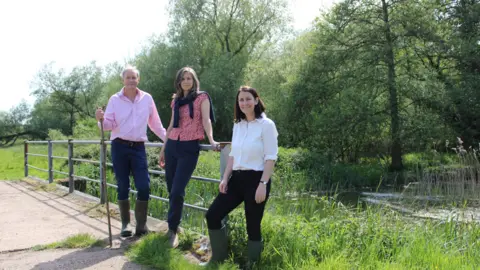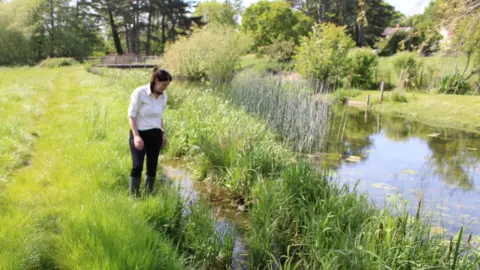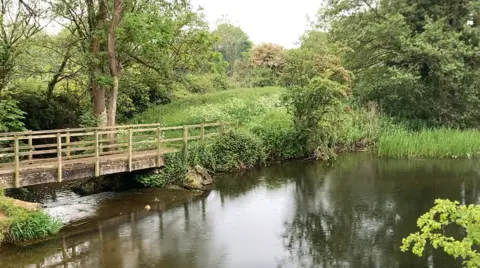'Doing nothing is not an option for river's future'
 East Suffolk Catchment Partnership
East Suffolk Catchment PartnershipCampaigners have said "doing nothing" is not an option in securing their local river's future.
Representatives from conservation, farming and other industries have for the first time come together to improve the health of Suffolk's River Deben.
The East Suffolk Catchment Partnership (ESCP) group has produced the "Recovering the Deben - From Source to Sea" plan which aims to improve water quality.
Dr Helen Dangerfield, a director at Essex & Suffolk Rivers Trust who is co-ordinating the action, said just 11% of the river was meeting ecological standards.
"The threat to the estuary is very real - only about 11% of the river that feeds into the estuary is at good ecological status which means it is polluted; it is suffering from historical modification and things that humans have done to the river," Dr Dangerfield explained.
"The estuary is currently described as unfavourable-declining... it is progressively getting worse."
Dr Dangerfield added "doing nothing" was not an option and the group was "desperate to see the river and estuary in recovery".
The River Deben flows for nearly 25 miles from its source near Debenham, past Woodbridge and Sutton Hoo and out to sea at Felixstowe Ferry.
It is internationally recognised as a Ramsar site due to its importance to birds and habitats and is a site of special scientific interest (SSSI), giving it legal protection.
 East Suffolk Catchment Partnership
East Suffolk Catchment PartnershipDr Dangerfield said a "wide range of other factors" affected the river included:
- phosphates and nitrates running off farmland and roads.
- historic weirs and structures blocking fish moving through the river and in the summer these blockages could lead to water temperatures rising in those blocked stretches
"If we take transformative action and really pull together [it can be pulled back from the brink]," she said.
"We want to see action and people in our communities, landowners, local businesses coming together."
Anglian Water said it had already begun to remove phosphates and E. coli from the water while the ESCP hoped to install a buffer along the riverbanks to prevent further pollution.
'Improving rather than declining'
Colin Nicholson, co-chairman of the River Deben Association, said the group was hoping to secure funding to work on its plan.
"I think everyone is aware they live in a special place and it's one of the roles of the association to generate and nurture the love that people have for the river," he explained.
"If people have got to change their habits, if farmers have got to change their practices and if we all love it then we'll do it.
"I think what [the plan] will do is generate interest and pull in funding because it costs a lot of money to do these things."
 Luke Deal/BBC
Luke Deal/BBCThe government's water minister Robbie Moore backed the initiative and said: "The River Deben catchment is of fundamental importance to businesses, communities and wildlife.
"Following our successful round table held last August, the ESCP has developed an ambitious plan to improve the Deben and its surrounding environment."
Therese Coffey, Suffolk Coastal's Conservative MP and a former Secretary of State for the Environment who has faced criticism from some local people over the quality of the Deben, said she backed the plan and called on the government to increase funding for the project.
Follow Suffolk news on Facebook, Instagram and X. Got a story? Email [email protected] or WhatsApp us on 0800 169 1830
